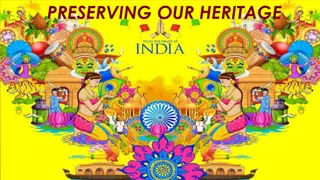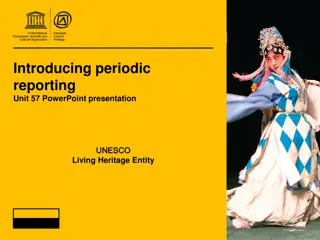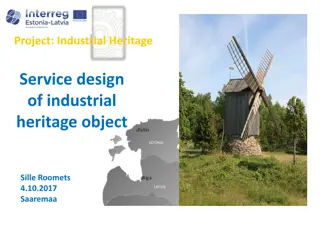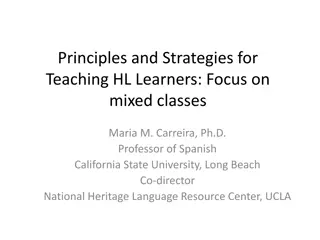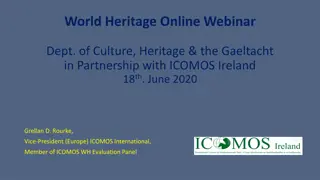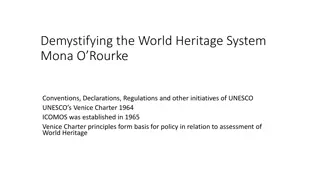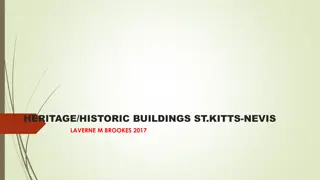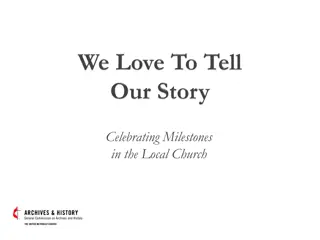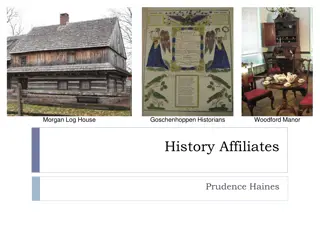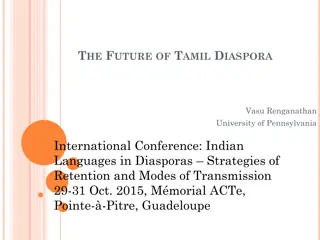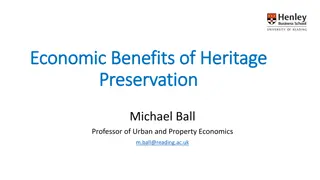Understanding Heritage and History: Importance and Sources
Delve into the significance of heritage and history, exploring the valuable legacy passed down by our ancestors. Discover the role of historians in preserving our past and the diverse sources that unlock the secrets of bygone eras. Gain insights into the emergence of states and their governance, reflecting on Nigeria's rich historical tapestry. Uncover the essence of our national anthem's tribute to past heroes and the enduring relevance of studying history for shaping the future.
Download Presentation

Please find below an Image/Link to download the presentation.
The content on the website is provided AS IS for your information and personal use only. It may not be sold, licensed, or shared on other websites without obtaining consent from the author. Download presentation by click this link. If you encounter any issues during the download, it is possible that the publisher has removed the file from their server.
E N D
Presentation Transcript
THE HERITAGE OF THE PAST BY DR. YUSUF UMAR MADUGU Department of History, Bayero University, Kano Phone No: 08036552762 E-MAIL: yumadugu.his@buk.edu.ng
The labor of our Heroes past shall never be in vain The above quotation is from the Nigeria s National Anthem. It underscores the following importance which we place on the efforts of our ancestors in bequeathing to us a nation which we are proud of. It recognizes the dignity of labour and selfless service to humanity. It encourages patriotism among citizens and reminds us of our past that is our history.
Heritage in simple terms refers to the things which our ancestors create in the past which has historical importance and passed on to us. Such things can be divided into two namely materials and non-materials. The former refers to such things as historical artefacts that is the handiwork of our ancestors ranging from buildings, domestic utensils to farm tools/artistic works etc. And by non-material, we are referring to religion, beliefs, knowledge, traditions, values, witchcraft, sorcery, ideas and anything within the material realm of man, which can or are transmitted from generation to generation. implements, weaving
How then do we know about our past and our heritage of the past? We knew these through our study of history. You may then want to know what is history? History is the study of the activities of man carried out over time (Collinwood 1946) i.e. what was done in the past, what is being done in the present and what is to be done in the future. History entails the understanding of the past and how it is related to the present which will serve as a key to the preparation of the future (Jenkins: 1995). For that to be achieved, the heritage of the past has to be properly upheld, conserved and maintained. That has been the duty of historians.
what are the sources of history? For the historian, the source of history are traces or evidences of man s existence which he leaves behind and this could be material or non- material written documents, oral tradition and archaeology. Hence as Collingswood rightly points out; the historian can rediscover what has been completely forgotten, in the sense that no statement of it has reached him by an unbroken tradition from eye witnesses. He can even discover what until he discovered it no one ever knew to have happened at all.
Emergence of State and their Administration The country in which we live and carry out our activities which today is known as Nigeria , before the coming of the British, various people lived in the Nigeria area in kingdoms and chiefdoms and even in hat some scholars have described as stateless societies. Let us mention some of them; Hausa states Katsina, Kanem Borno, Nupe kingdom, Jukun, Igala Kingdom, Oyo, Ijesha, Benin, the Igbo people, Ebira, Tiv etc. let us briefly discuss some of them.
Inter-state and Communal Relations Although there was no Nigeria before the coming of the British and the subsequent conquest and amalgamation of the people, it has been established that the various people and kingdoms/chiefdoms interacted with each other in different ways such as warfare, economics i.e. trading, culture i.e. inter-marriages, linguistic relations, political and religious etc. Let us cite a few examples: There was political and economic relationship between the Nupe and Yoruba; and between the Hausa and Yoruba (Falola 128). political influence of the Hausa on the Yoruba can be discerned from their linguistic influence as is reflected in the political vocabulary of the Yoruba of Ibadan as mentioned by Falola Seriki (Hausa Sarki), Mogaji (Hausa Magaji) talika (Hausa talaka) (Falola 1984: 66-77). In terms of economics the most famous commodity, which had brought the Hausa and the Yoruba together, was the Kola nut The
Nigeria: Between 1860 and 1903 the British had conquered all the Kingdoms and people in the Nigeria area through warfare or peaceful submission. In 1914, the Northern and Southern Protectorates were amalgamated and Nigeria was created as one country. The implication of this act of the British was that the various Kingdoms/Chiefdoms and people that had existed as autonomous and independent bodies had been dissolved into a greater polity known as Nigeria. Thus the Nigerian identity was established (Ikime 1977). How did the British create Nigeria? It was not easy. The British had to fight and conquer the various kingdoms/chiefdoms and peoples of the Nigerian area. The conquest of the Nigerian area was largely and effectively carried out by a small but disciplined force known as the Royal Niger Constabulary (RNC) and Royal West African Frontiers Force (RWAFF). The conquest was carried out under several excuses such as the desire to abolish slave trade, hostility from the Natives against the British or Christian Missionaries, dubious treaties etc
Religion and Religious relations Before the coming of the Europeans, there were two religions i.e. Islam and traditional religions. Borno and the Sokoto Caliphate in the northern part were Islamic states but all other states practiced traditional religion. Let us examine Islam its spread and impact on the people. It is not known exactly when Islam was brought to the Nigerian area. Some writers have indicated that it registered its presence in the area of Kanem (Borno) in the seventh century. What is however certain is that by the 11thcentury when Mai Hume Jilmi, the eleventh ruler of Borno accepted Islam from the hands of Arab scholars and made it the state religion, it was a religion which was well known to his people (Mustapha, 1987). In Hausa land, Islam became spread in the 14thcentury when various rulers of the Hausa states of Kano, Katsina, Zazzau and others accepted Islam. In the case of the Hausa state Wangara traders from Mali spread Islam. Since the acceptance of Islam by the people of Borno and Hausa land, Islam became central in the lives of the people, affecting their daily life and relations with other people.
Women in History Women in History: in Nigerian history, women have occupied important positions in society. They were active participants in the affairs of the society. In number of societies in the Nigerian area women occupied key positions or played important roles in the lives of their people. In Borno, the Magira (Queen Mother) was a very prominent member of the Administration. The mother of Idris Aloma who was the most famous of the Mais of Borno, Magira Aisha, held the regency of Borno for ten years (1562 1572) before Idris Aloma became matured enough to run the affairs of the state of Kanem Borno. Apart from the Magira there was also the Gumsu the first wife of the Mai who had control over the administration of the palace. In Hausa land, there were women rulers or Queens such as Tawa of Gobir andAmina of Zazzau (1536 1576). The latter was the eldest daughter of another female ruler known as Bakwa Turunku who had earlier established the towns of Turunku and later Zaria.
The role of Museums and Monuments It is an institution which is charged with the responsibility for the collection, preservation and display of natural and cultural objects in the society. Such objects are usually displayed or exhibited by the Museum for interested members of the public. In this way the history of our ancestors are not only preserved but also vividly re-created in a concrete way and transmitted from one generation to another. While a monument on the other hand is a famous site or building structure that is preserved because of its historical, cultural or aesthetic examples of important monuments in Nigeria includes Sukur Cultural Landscape in Adamawa, Kano Ancient City Walls and Gates, Marina Slave History Museum in Calabar, tomb of Shehu Usman dan Fodio in Sokoto among others. importance. Some
Conclusion Let us conclude this paper by summarizing what we have discussed so far. Our ancestors have left for us a rich cultural heritage material and non-material; weaving tools, iron implements, arts, good political organization and culture, religion, education etc. We are blessed with historians who are not only conscious of the past but seek to understand, preserve it and relate with the present in a significant way. We have a history, make history and are historically proud of our history. We must study our past and present in order to make progress and not simply romanticize our heritage and continue to sink into the abyss of darkness. peaceful co-existence,



